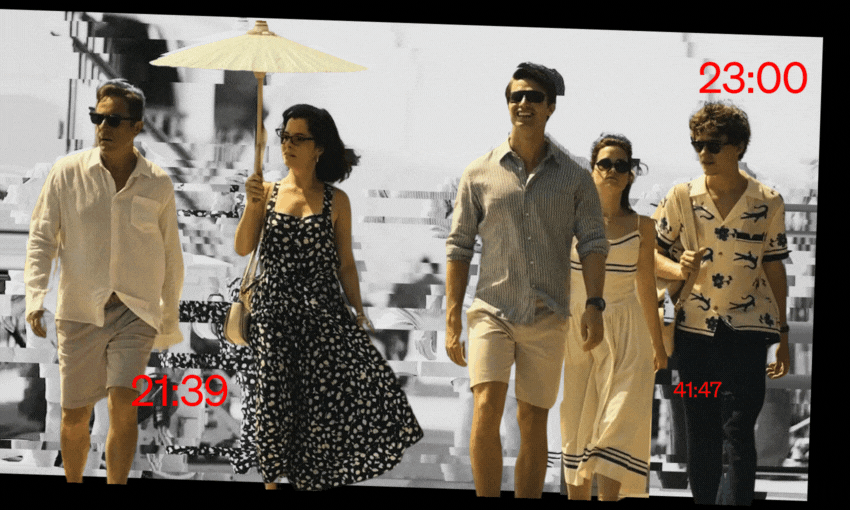Swiftposium 2024 organiser Dr Rebecca Trelease tells Alex Casey how the idea grew from a tweet into a three-day conference that’s had over 350 submissions.
You may recognise Dr Rebecca Trelease (Te Āti Haunui-a-Pāpārangi) from the second season of The Bachelor NZ – memorably eliminated after she revealed to Jordan Mauger that she had written a thesis about reality television (no greater betrayal). Now working as a senior lecturer at AUT, she’s recently embarked on a new journey packed with even more romance, heartbreak, gossip and analysis than The Bachelor NZ could ever dream of: organising an intensive three-day academic conference dedicated entirely to Taylor Swift.
Swiftposium 2024 (Melbourne, Feb 11-13) is the first of its kind in the world, but academic inquiry into Taylor Swift is nothing new. New York University has launched a course dedicated to the evolution of Swift’s music, Stanford University currently offering an “All Too Well (Ten Week Version)” and the University of Missouri is home to Taylor Swiftory: History & Literature Through Taylor Swift. Closer to home, a seminar held last year at Te Herenga Waka looked to analyse the poetic merits of Swift’s album Midnights.
The idea for a conference came to Trelease after she secured tickets to the Melbourne leg of Swift’s record-breaking, bracelet-making, earth-shaking Eras tour. “I saw on social media that at least five Australian academics that were Taylor fans had got their tickets for Melbourne, and I thought ‘well maybe we could all hang out and talk about her?’” A friend at the University of Melbourne casually tweeted out the idea of a conference, and quickly people from all over Australasia and the rest of the world started getting in touch.
“It really just started as me trying to find a way to hang out with other like-minded people,” says Trelease. “I was just thinking we could sit in a classroom somewhere and talk.” But as interest grew and seven universities (six from Australia, and AUT in New Zealand) threw their support behind the idea, it became clear that this was not just going to be a small soiree for scholastic Swifties. They set up a website and received over 350 presentation submissions in just a few weeks, including one from Trelease examining Taylor Swift as an educational tool.
“Taylor is very useful in my teaching pedagogy,” she explains. “When I’m lecturing or when I’m taking workshops, I always use Taylor Swift as a really accessible way into academic theory.” For example, her class about parasocial connections is rife with Swift. “We feel like she is our best friend, we know everything about her life – her boyfriends, the struggles in her career – but she has no relationship back with us. It’s all parasocial.” Although Swift isn’t for everyone, the pop star’s ubiquity is invaluable when creating common ground in the classroom.
“Anyone who takes one of my classes at AUT is sick of hearing about Taylor by the end of it, but if they understand the theory, and the point I’m trying to make, then it’s all worth it,” she says.
As for the other hundreds of academic submissions? They are still being sorted through, but Trelease says they will welcome presentations from all areas of academia. Suggestions on the website include ‘When my depression works the graveyard shift’: Mental health discourse and Taylor Swift; ‘Shade never made anybody less gay’: Taylor Swift’s relationship to social movements and influence on political discourse; and ‘I was so ahead of the curve, the curve became a sphere’: Taylor Swift as pop culture catalyst, prophet and mirror.
Just as the Eras tour can boost the local economy by hundreds of millions of dollars in a single weekend, Trelease is excited about the impact that a three day academic event like Swiftposium might have on university intake in years to come. “Think of all the high school students who have just realised you can go to university and study someone like Taylor Swift, and it could become a career,” she muses. “To prove to people that you can look at your favourite popstar in this way could totally change the face of academia.”
Like Swift herself, Trelease is used to her work being dismissed as frivolous or less worthy by her industry peers. “It’s definitely coming from this perception that if something is low class, it’s not worthy of academic investigation,” she says. “But of course it is, and the only reason they might not think so is because they’re looking down on it in terms of taste.” Her sell on Swift is simple: “She’s important because she reaches so many people. That power to actually speak to the masses, but still affect us on an individual level, is so powerful.”
Thankfully, Trelease stopped caring what people thought about her academic pursuits a long time ago. “I’ve come across that attitude a lot, especially with my reality television work, where people have just outright said to my face, ‘Oh my god, I hate reality. It’s awful, it’s the worst stuff on television… but I love MasterChef’,” she sighs. “I’ve just learned to get on with it. Just because some people might think it’s frivolous doesn’t mean you shouldn’t do it, and everyone should just let people enjoy what they enjoy.”
On that note, what is Trelease’s favourite Taylor Swift era? “Definitely Reputation,” she laughs. “Because I like that not everyone likes it.”



